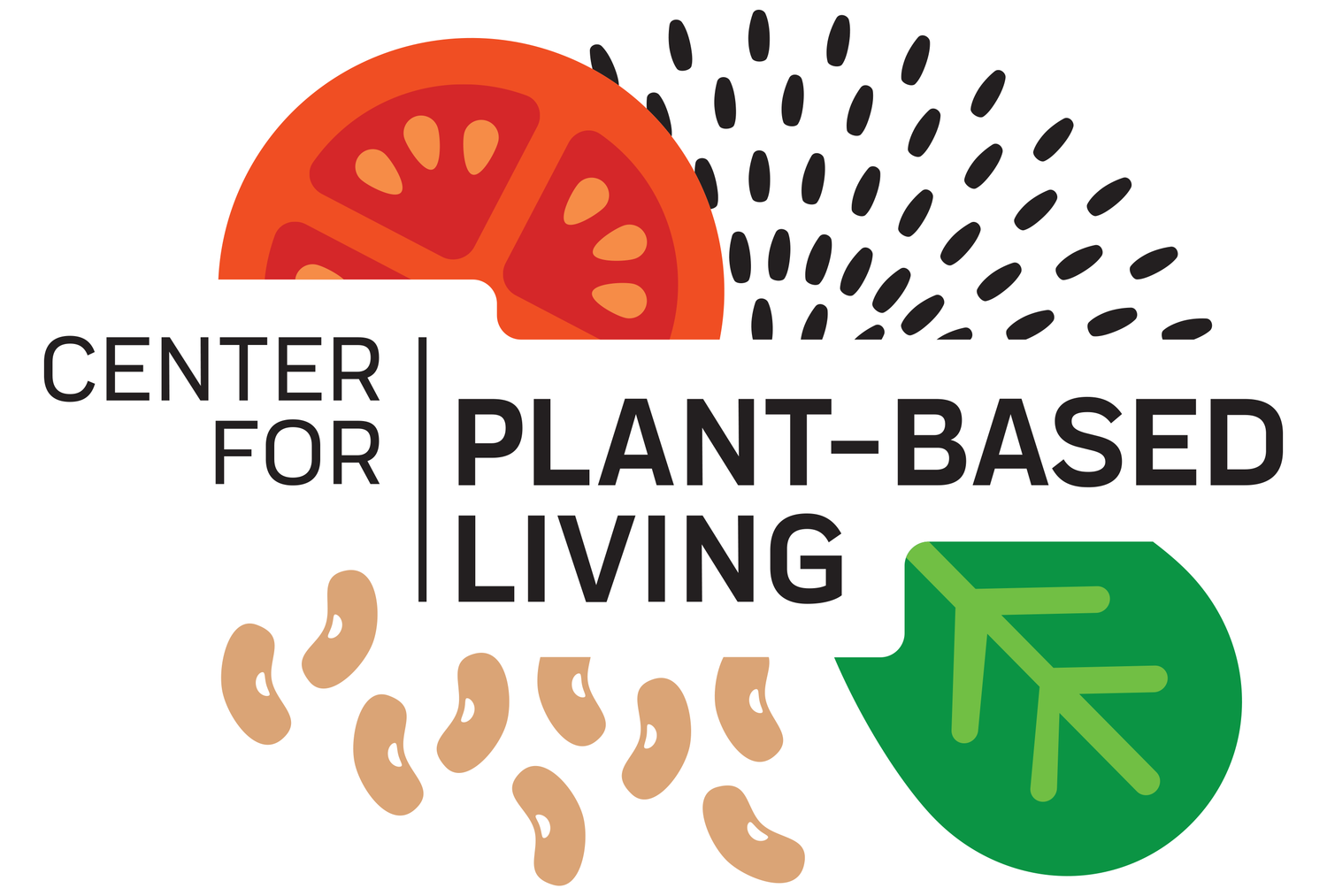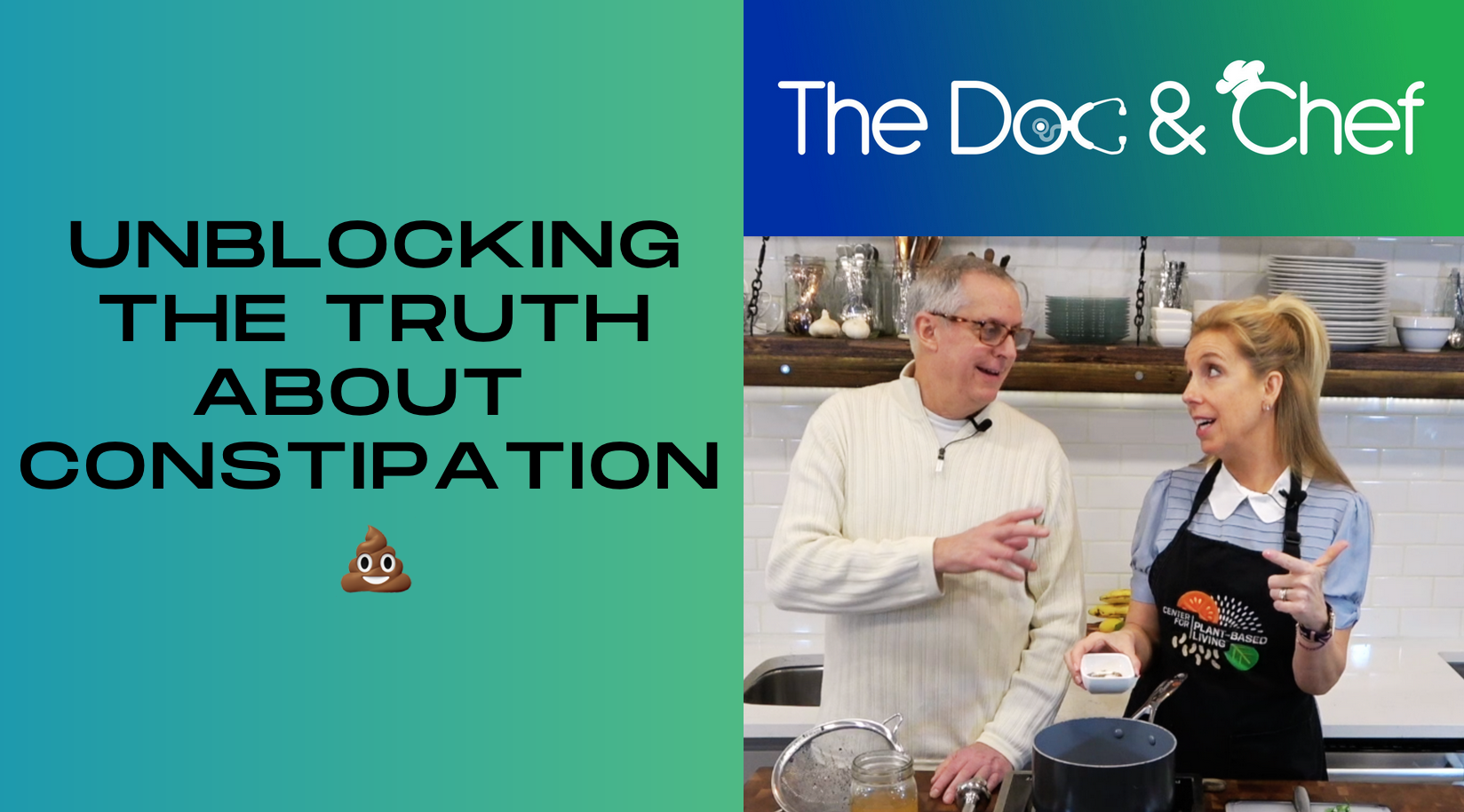THE DOC AND CHEF SHOW EP. 7: UNBLOCKING THE TRUTH ABOUT CONSTIPATION // SUPPORTING SCIENCE AND THE RECIPE
Constipation is the most common gastrointestinal complaint in the United States and is common among all ages and populations. About 16 out of 100 adults have symptoms of constipation. About 33 out of 100 adults ages 60 and older have symptoms of constipation.[1] It is defined as:
· fewer than three bowel movements a week
· stools that are hard, dry, or lumpy
· stools that are difficult or painful to pass
· a feeling that not all stool has passed
Constipation can be caused by various factors, including:[2]
1. Inadequate fiber intake: A diet low in fiber can contribute to constipation. Fiber adds bulk to the stool, making it easier to pass through the digestive system.
2. Lack of physical activity: Leading a sedentary lifestyle or not getting enough exercise can slow down the natural contractions of the intestines, resulting in constipation.
3. Dehydration: Insufficient fluid intake can lead to hardened stool and difficulty in passing it. It is important to drink an adequate amount of water and stay hydrated.
4. Medications: Certain medications, such as opioids, antacids containing calcium or aluminum, antidepressants, and some blood pressure medications, can cause constipation as a side effect.
5. Medical conditions: Several medical conditions can contribute to constipation. These include irritable bowel syndrome (IBS), thyroid disorders, diabetes, multiple sclerosis, Parkinson's disease, and structural abnormalities in the digestive system.
6. Changes in routine: Traveling, changes in daily routine, or disruptions in regular eating habits can affect the normal bowel patterns and lead to constipation.
7. Ignoring the urge to have a bowel movement: Suppressing the urge to have a bowel movement can lead to constipation over time. Ignoring or postponing the urge can cause the stool to become harder and more difficult to pass.
8. Emotional and psychological factors: Stress, anxiety, and depression can affect the functioning of the digestive system and contribute to constipation.
It's important to note that the causes of constipation can vary from person to person, and in some cases, multiple factors may be involved. If you experience chronic or severe constipation or a change in your bowel habits, it is recommended to consult a healthcare professional for proper evaluation and treatment.
Chronic constipation can have several potential health consequences and complications. These may include[3]:
1. Hemorrhoids: Straining during bowel movements can lead to the development of hemorrhoids, which are swollen and inflamed blood vessels in the rectal area. Hemorrhoids can cause pain, itching, and bleeding. About half of all people will have hemorrhoids by age 50. Other risk factors include pregnancy, and obesity.[4]
2. Anal fissures: Hard, dry stools can cause small tears in the lining of the anus, known as anal fissures. These fissures can be painful and may cause bleeding during bowel movements.
3. Fecal impaction: If constipation is severe and left untreated, a large, hardened mass of stool known as fecal impaction can occur. Fecal impaction is difficult to pass and may require medical intervention to remove it.
4. Rectal prolapse: Chronic straining during bowel movements can weaken the muscles and tissues in the rectum, leading to rectal prolapse. This condition involves the rectum protruding from the anus.
5. Diverticulosis: Constipation can increase the risk of developing diverticulosis, a condition where small pouches form in the lining of the colon. These pouches can become inflamed or infected, resulting in diverticulitis. Diverticulosis occurs in about 10% in those younger than 40 years, but increases significantly with age, affecting up to 50 to 70% in those older than 80 years. The lifetime risk of diverticulitis in a person with diverticulosis was reported to range from 10% to 25%.[5]
6. Bowel obstruction: In rare cases, chronic constipation can lead to a complete blockage of the bowel, known as a bowel obstruction. This condition requires immediate medical attention and can cause severe abdominal pain, vomiting, and the inability to pass stool or gas.
7. Impaired quality of life: Chronic constipation can significantly impact a person's quality of life, causing discomfort, pain, and frustration. It can interfere with daily activities, work productivity, and social functioning.
The treatment of constipation depends on the underlying cause and severity of the condition. In many cases, constipation can be managed effectively through lifestyle changes and over-the-counter remedies. Here are some common treatment approaches[6]:
1. Dietary modifications:
- Increase fiber intake: Consuming more high-fiber foods, such as fruits, vegetables, whole grains, and legumes, can help add bulk to the stool and promote regular bowel movements.
- Stay hydrated: Drinking an adequate amount of water and fluids throughout the day can soften the stool and facilitate easier passage.
- Limit processed foods: Processed foods, low-fiber snacks, and foods high in fats can contribute to constipation. It's beneficial to reduce their consumption.
2. Regular exercise:
- Engaging in regular physical activity can stimulate bowel movements and promote overall digestive health. Aim for at least 30 minutes of exercise most days of the week.
3. Establishing a regular bathroom routine:
- Create a habit of visiting the bathroom at the same time every day, preferably after meals, to take advantage of the body's natural reflexes.
4. Over-the-counter remedies:
- Fiber supplements: If increasing dietary fiber is not sufficient, fiber supplements like psyllium husk or methylcellulose can be taken to add bulk to the stool.
- Osmotic laxatives: These help soften the stool and increase water content in the intestines, making it easier to pass. Examples include polyethylene glycol (PEG) or lactulose.
- Stool softeners: These medications help moisten the stool and make it easier to pass. Docusate sodium is a commonly used stool softener.
5. Prescription medications:
- If lifestyle modifications and over-the-counter remedies are ineffective, a healthcare professional may prescribe medications to stimulate bowel movements.
However, long-term and excessive use of laxatives can have potential dangers and risks. Some of the possible consequences include[7]:
1. Dependency and decreased natural bowel function: Regular and prolonged use of laxatives can lead to dependency, where the body becomes reliant on the laxatives to have bowel movements. Over time, the natural reflexes and muscle contractions in the intestines may become weakened, making it difficult for the body to have normal bowel movements without the assistance of laxatives.
2. Electrolyte imbalances: Certain types of laxatives, such as stimulant laxatives, can cause electrolyte imbalances in the body. Electrolytes like potassium, sodium, and magnesium are essential for maintaining proper bodily functions. Prolonged laxative use can disrupt the balance of these electrolytes, leading to conditions such as dehydration, muscle weakness, irregular heartbeat, and in severe cases, cardiac arrhythmias.
3. Dehydration and fluid imbalances: Some laxatives work by drawing water into the intestines, which can result in increased fluid loss through bowel movements. This can lead to dehydration if adequate fluid intake is not maintained. Chronic dehydration can affect various bodily functions and lead to complications such as dizziness, fatigue, and kidney problems.
4. Irritable bowel syndrome (IBS): Long-term laxative use can contribute to the development or worsening of irritable bowel syndrome, a chronic condition characterized by abdominal pain, bloating, and altered bowel habits.
5. Damage to the colon: Overuse of certain types of laxatives, particularly stimulant laxatives, can potentially cause damage to the colon. This can include inflammation of the colon lining, known as colitis, or damage to the nerves and muscles of the colon, leading to a condition called "lazy colon" or colonic inertia.
It's important to consult with a healthcare professional, especially for chronic or severe constipation. They can assess your specific situation, determine the underlying cause, and recommend the most appropriate treatment plan. Additionally, they can evaluate if there are any underlying medical conditions contributing to constipation that require further investigation or specialized treatment.
As mentioned previously, one of the most important ways to be sure you have regular bowel movements is to be sure you are consuming enough fiber. The average fiber intake among Americans aged 1 year and older was around 16 grams per day for males and 13 grams per day for females.[8] These values are considerably lower than the recommended daily intake, which is closer to 30-40 grams per day. Increasing fiber intake can other health benefits, including reducing the risk of certain diseases such as heart disease, type 2 diabetes, and some types of cancer and aiding in weight management.[9]
So what is fiber?
Fiber is a type of carbohydrate found in plant-based foods that cannot be digested or absorbed by the human body. Instead of being broken down and absorbed like other nutrients, fiber passes through the digestive system relatively intact.[10] Dietary fiber can act as prebiotics. Prebiotics are non-digestible fibers that serve as a food source for beneficial bacteria in the gut, promoting their growth and activity. These beneficial bacteria, often referred to as probiotics, play a crucial role in maintaining a healthy gut microbiota.[11]
There are two main types of dietary fiber:
1. Soluble Fiber: This type of fiber dissolves in water to form a gel-like substance in the digestive tract. Soluble fiber can help regulate blood sugar levels and lower cholesterol levels. Good sources of soluble fiber include oats, barley, legumes (beans, lentils), fruits (such as apples, oranges, and berries), and some vegetables (such as carrots and Brussels sprouts).
2. Insoluble Fiber: Insoluble fiber does not dissolve in water and adds bulk to the stool, helping to prevent constipation and promote regular bowel movements. It can help maintain a healthy digestive system. Good sources of insoluble fiber include whole grains (such as wheat, brown rice, and quinoa), wheat bran, nuts, seeds, and many vegetables (such as broccoli, cauliflower, and celery).
Both soluble and insoluble fiber are important for overall health, and a well-balanced diet should include a variety of foods that provide both types of fiber.
It's worth noting that different foods contain varying amounts of fiber, so consuming a diverse range of plant-based foods is essential to obtain an adequate intake of both soluble and insoluble fiber. It is recommended to gradually increase fiber intake to allow the digestive system to adjust and to drink plenty of water throughout the day to support proper digestion and prevent discomfort.
In summary, while there are several underlying medical problems that can contribute to chronic constipation, most are lifestyle related. So, if you want to keep it regular, be sure you stay active, drink plenty of water, and most important, eat your fiber!
[1] Gastroenterology. 2013;144(1):211–217.
[2] Medicine (Baltimore). 2018 May;97(20):e10631
[3] Neurogastroenterol Motil. 2021 Jun;33(6):e14050
[4] Curr Gastroenterol Rep. 2017 Jul;19(7):30.
[5]J Gastrointestin Liver Dis. 2019 Dec 19;28(suppl. 4):7-10
[6] Nutrients. 2021 Sep 26;13(10):3386
[7] Drugs. 2010 Aug 20;70(12):1487-503
[8]Nutr Rev. 2020 Aug 1;78(Suppl 1):29-36
[9] Nutrients. 2020 Oct 21;12(10):3209
[10] Nat Rev Gastroenterol Hepatol. 2021 Feb;18(2):101-116.
[11] Gut Microbes. 2017 Mar 4;8(2):172-184.
Smoky Black Bean and Salsa Soup
🥦 Do you know about our STREAMING PLUS membership?
Our membership is built like a streaming service - you get a full library of plant-based cooking classes to watch whenever you want. PLUS, you gain access to upcoming interactive virtual cooking classes and a monthly accountability group call.
As a member you get:
Complete library of all past virtual classes - stream them whenever you’d like!
Free access to upcoming virtual classes
Library of easy and quick recipes: 100 and growing
Access to private Facebook group
Monthly accountability check-in and support group Zoom call with Caryn
Quarterly “Ask the Doc” call with Dr. Jim Loomis, our Medical Director
A community of support
To learn more, please visit us here.


